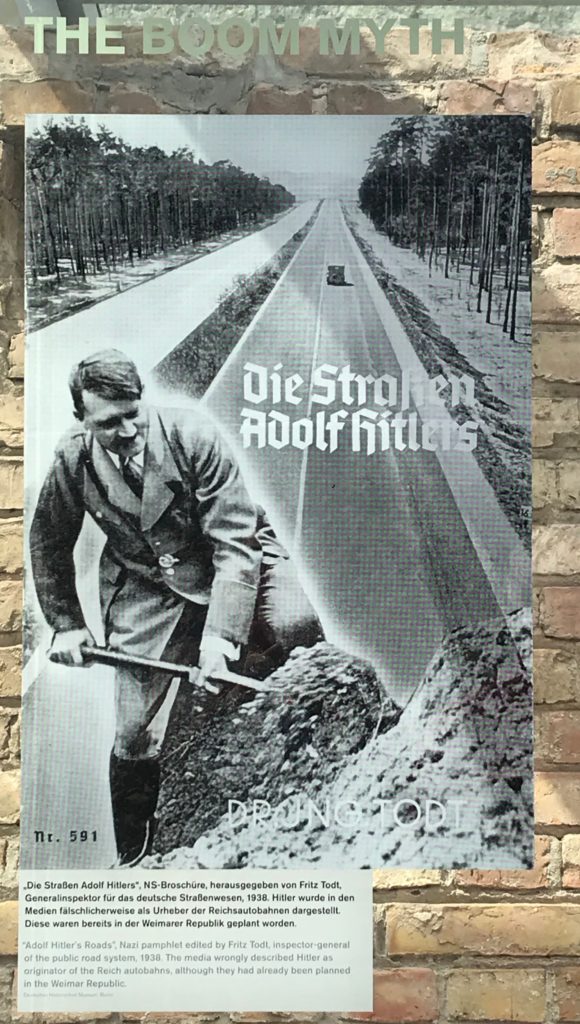
In January of 1933, Hitler became Chancellor of Germany. On March 23, 1933, Germany voted to abandon democracy in favor of a Nazi dictatorship. In April of 1933, the out-going British ambassador to Germany, Horace Rumbold, wrote a five-thousand word telegram concerning what he believed to be Hitler’s goals and the German situation. There is something very disconcerting, if not actually enraging, about reading it, since it is so prescient.
Rumbold points out that, within a few months of attaining power, Hitler and the Nazis had criminalized dissent, brutally silenced all critics, and created an extraordinary propaganda system. Rumbold summarizes Hitler’s plans were openly stated in Mein Kampf and various speeches of his and other high-ranking Nazi officials. That plan was to claim to want peace all the while engaging in the complete ideological and practical militarization of Germany in order to start a war that will enable Germany to incorporate all parts of Europe that have German speakers, and expand into Russia and the Baltic States. Hitler is determined to get war, not just because of what it will gain Germany, but because of his commitment to seeing a nation as an organism which must fight for its existence or be “doomed to extinction” (5).
And, as early as April of 1933, Rumbold recognized that central to Hitler’s understanding of militarism and nationalism was the goal of a Germany without Jews, and that Hitler was rigidly committed to “the campaign against the Jews” (6). Rumbold summarizes Hitler’s plan for the immediate future: “Germany needs peace until she has recovered such strength that no country can challenge her without serious and irksome preparations [….] The aim of [Hitler’s] policy is to bring Germany to a point of preparation, a jumping-off point from which she can reach solid ground before her adversaries can interfere” (8). Elsewhere I (and lots of other people) have argued that anything other than appeasement was so politically and rhetorically unpopular that to advocate policies grounded in taking Rumbold’s prescience seriously would have been political suicide. Resisting Hitler was simply too unpopular.
While all the most effective anti-appeasement policies were unpopular, Hitler was not. On July 10, 1933 (so just two months after Rumbold’s telegram), the Viscount Rothermere (owner of The Daily Mail) published in that paper a piece praising Hitler and what he called “Naziland.” His argument is in his last paragraph (in bold and larger font):
“The world’s greatest need to-day is realism. Hitler is a realist. He has saved his country from the ineffectual leadership of hesitating, half-hearted politicians. He has infused into its national life the unconquerable spirit of triumphant youth.“
Rothermere claims to have carefully studied Germany and the Nazi movement for several years, so he would be well aware of the criticisms noted by Rumbold (and others): the abandonment of representative politics, persecution of all political opponents and even critics, openly-stated goal of eliminating Jews from the nation, and militarism. The assumption that many people make is that people in the UK who thought Hitler wasn’t that bad didn’t recognize him for what he was. Rothermere did. He liked it.
Rothermere liked fascism. He praised Mussolini and his “collaborators” because “Together they have made their country to best-governed State in Europe.” He says that “foremost” of Hitler’s accomplishments is “the liberation of [Germany] from the rule of the frowsy, down-at-hell German Republic, which was totally lacking in prestige, self-confidence, and even self-respect.” He acknowledges that there has been some criticism of how the Nazis have treated their opponents, but dismisses it as coming only from communist admirers of Stalin: “The plain, blunt patriotism of Hitler and his followers is highly alarming to our parlour-Bolsheviks and cultured Communists.”
In a section titled “Misplaced Horror,” he says that these communists
“Have started a clamorous campaign of denunciation against what they call “Nazi atrocities,” which, as anyone who visits Germany quickly discovers for himself, consist merely of a few isolated acts of violence such as are inevitable among a nation half as big again as ours, but which have been generalized, multiplied, and exaggerated to give the impression that Nazi rule is a bloodthirsty tyranny.”
Rothermere goes on to say that “the old women of both sexes” denounced Italian fascists’ “outrages” (which he has in scare quotes) when those actions consisted of nothing more than “the administration of a few doses of castor-oil to Communists” and, just as “the incidental extravagances of the early days of Fascism are forgotten,” “the minor misdeeds of individual Nazis will be submerged by the immense benefits that the new regime is already bestowing upon Germany.”
Italian fascists weren’t as obsessed with (or oppressive of) Jews as Nazis were and always had been, so someone might point out that the persecution of Jews (as Rumbold noted, one aspect of the Nazi platform to which Hitler was obstinately committed) meant the outrages were not the misdeeds of a few individuals, but an important point in the Nazi political agenda. It was, after all, in the open. And something that is tremendously important to understand is that the people who argued that Hitler wasn’t so bad, and, in any case, he was better than Stalin, didn’t object to his anti-Semitism. Like Rothermere, they endorsed it. In a section sub-titled “Alien Elements” Rothermere says,
“The German nation, moreoever, was rapidly falling under the control of its alien elements. In the last days of the pre-Hitler regime there were twenty times as many Jewish Government officials in Germany as had existed before the war. Israelites of international attachments were insinuating themselves into key positions in the German administrative machine. Three German Ministries only had direct relations with the Press, but in each case the official responsible for conveying news and interpreting policy to the public was a Jew.”
In other words, Rothermere supported and celebrated Hitler because he liked everything about Nazism. He was a Nazi.
